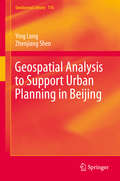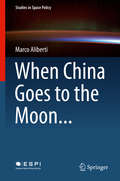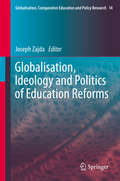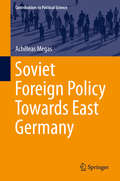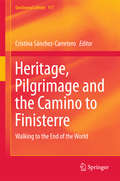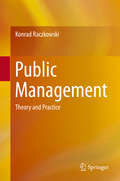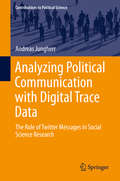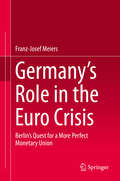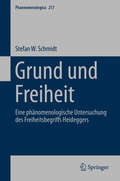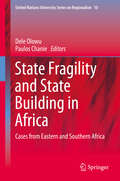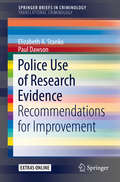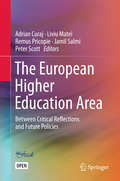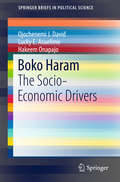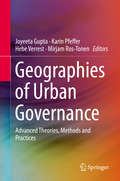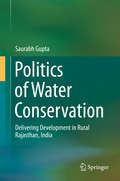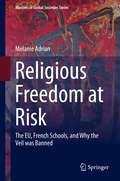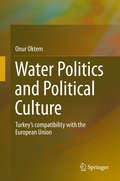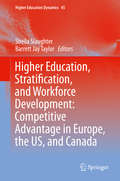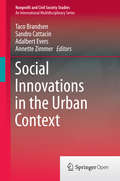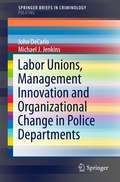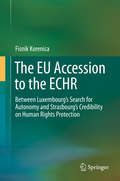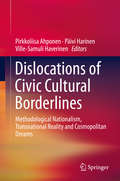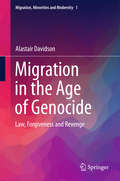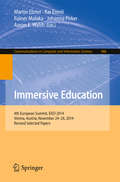- Table View
- List View
Geospatial Analysis to Support Urban Planning in Beijing
by Ying Long Zhenjiang ShenThis book describes a comprehensive framework of novel simulation approaches, conventional urban models, and related data mining techniques that will help develop planning support systems in Beijing as well as other mega-metropolitan areas. It investigates the relationships between human behaviors and spatial patterns in order to simulate activities in an urban space, visualize planning alternatives, and support decision making. The book first explains urban space using geometric patterns, such as points, networks, and polygons, that help identify patterns of household and individual human behavior. Next, it details how novel simulation methodologies, such as cellular automaton and multi-agent systems, and conventional urban modeling, such as spatial interaction models, can be used to identify an optimal or a simulated solution for a better urban form. The book develops a comprehensive land use and transportation integrated model used to explore the spatial patterns of mutual interaction between human mobility and urban space. This model can help forecast the distribution of different types of households, rent prices, and land prices, as well as the distribution of routes and traffic volume based on an appraisal of labor demand and supply. This book shows how geospatial analysis can be a useful tool for planners and decision makers to help in ascertaining patterns of activities and support urban planning. Offering both novel and conventional approaches to urban modeling, it will appeal to researchers, students, and policy makers looking for the optimal way to plan the d evelopment of a mega-metropolitan area.
When China Goes to the Moon...
by Marco AlibertiThis book is about China's ambitions in its most complex and internationally visible space endeavor, namely its human space exploration programme. It provides a comprehensive reflection on China´s strategic direction and objectives in space, including in particular those set forth in its human spaceflight programme and analyses the key domestic and external factors affecting the country's presumed manned lunar ambitions. The objective of the book is to disentangle the opportunities and challenges China´s space ambitions are creating for other spacefaring nations and for Europe in particular. It therefore includes an in-depth analysis of possible European postures towards China in space exploration and seeks to stimulate a debate on future space strategies in the broader context of world politics.
Globalisation, Ideology and Politics of Education Reforms
by Joseph ZajdaThis 14th volume in the 24-volume book series sets out to explore the interrelationship between ideology, the state, and education reforms, placing it in a global context. It examines some of the major education reforms and policy issues in a global culture, particularly in the light of recent shifts in accountability, quality and standards-driven education, and policy research. By doing so, it provides a comprehensive picture of the intersecting and diverse discourses of globalisation and policy-driven reforms in education. The book draws upon recent studies in the areas of globalisation, equality, and the role of the state. It explores conceptual frameworks and methodological approaches applicable in the research covering the state, globalisation, and education reforms. It critiques the neo-liberal ideological imperatives of current education and policy reforms, and illustrates the way that shifts in the relationship between the state and education policy affect current trends in education reforms and schooling globally. Individual chapters critically assess the dominant discourses and debates on education and policy reforms. Using diverse comparative education paradigms from critical theory to historical-comparative research, the chapters focus on globalisation, ideology and democracy and examine both the reasons and outcomes of education reforms and policy change. They provide an informed critique of models of accountability, quality and standards-driven education reforms that are informed by Western dominant ideologies and social values. The book also draws upon recent studies in the areas of equity, cultural capital and dominant ideologies in education.
Soviet Foreign Policy Towards East Germany
by Achilleas MegasThis book examines Soviet Foreign Policy towards East Germany in the late 1980s. By focusing on the complex interaction between domestic political thought and developments in the international system, the author illustrates the hierarchical relationship between the GDR and the USSR and offers different perspectives for understanding Soviet foreign policy. The books demonstrates that shifts in Soviet policy towards the GDR stemmed, on the one hand, from the international level, in that Soviet security was legitimated by the existence of two full-fledged German states, and, on the other, may be best explained in terms of ideas and Gorbachev's new political philosophy.
Heritage, Pilgrimage and the Camino to Finisterre
by Cristina Sánchez-CarreteroThis book presents research concerning the effects of the Camino to Finisterre on the daily lives of the populations who live along the route, and the heritagization processes that exploitation of the Camino for tourism purposes involves. Rather than focusing on the route to Santiago de Compostela and the pilgrimage itself, it instead examines a peculiar part of the route, the Camino to Finisterre, employing multiple perspectives that consider the processes of heritagization, the effects of the pilgrimage on local communities, and the motivations of the pilgrims. The book is based on a three-year research project and is the result of a multidisciplinary collaboration between anthropologists, sociologists, historians and archaeologists. Instead of ending in Santiago, as the rest of the Caminos do, this route continues to the cape of Finisterre on the Galician Atlantic coast. This part of the Camino de Santiago is not officially recognized by the Catholic Church and does not count as part of reaching Compostela, the recognition granted by the Catholic Church to those pilgrims who have walked at least 100 km. For this reason, as well as its relationship with the sun cult, many pilgrims call this route "the Camino of the atheists. " In fact, the Catholic Church is a strong force for the heritagization of the rest of the Caminos, and maintains a clear ignoratio strategy concerning the Finisterre route: Officially, the church neither opposes nor recognizes this route.
Finding Solutions for Protecting and Sharing Archaeological Heritage Resources
by Anne P. Underhill Lucy C. SalazarThis volume provides case studies about successful strategies employed in diverse world areas for the protection of archaeological heritage resources. Some chapters focus on a search for solutions arrived at by diverse groups of people working in specific areas rather than simply describing loss of cultural heritage. Other chapters provide a long-term view of intensified efforts at protection of archaeological resources. The authors describe challenges and solutions derived by concerned people in eastern Asia (China, Japan, Thailand), West Africa, Easter Island, Jordan, Honduras and more than one area of Peru. All of the authors draw upon deep, personal involvement with the protection of cultural heritage in each area. This volume is a timely addition to a growing number of conferences and publications about the management of cultural heritage--both archaeological and historical.
Public Management
by Konrad RaczkowskiPublic management is undoubtedly an acknowledged area of management science, but with meager empirical research. This book takes this challenge and presents a rare analysis of public management from the perspective of 12 Prime Ministers of Poland who governed between 1989 and 2014. The author features the concepts, practice and challenges of public management by making use of direct interviews with the Prime Ministers according to the classical management functions of planning, organization, direction and controlling. The book also presents a theoretical inquiry which redefines public management by breaking away from the traditional paradigm of public management, and introducing a 'mega-organizational' understanding of the state within new institutional economics.
Analyzing Political Communication with Digital Trace Data: The Role of Twitter Messages in Social Science Research (Contributions to Political Science)
by Andreas JungherrThis book offers a framework for the analysis of political communication in election campaigns based on digital trace data that documents political behavior, interests and opinions. The author investigates the data-generating processes leading users to interact with digital services in politically relevant contexts. These interactions produce digital traces, which in turn can be analyzed to draw inferences on political events or the phenomena that give rise to them. Various factors mediate the image of political reality emerging from digital trace data, such as the users of digital services' political interests, attitudes or attention to politics. In order to arrive at valid inferences about the political reality on the basis of digital trace data, these mediating factors have to be accounted for. The author presents this interpretative framework in a detailed analysis of Twitter messages referring to politics in the context of the 2009 federal elections in Germany. This book will appeal to scholars interested in the field of political communication, as well as practitioners active in the political arena.
Germany's Role in the Euro Crisis
by Franz-Josef MeiersThis book analyses Germany's role in the euro crisis. Based on the perception of Berlin as the emerging capital of the European Union, the author investigates three interrelated issues: Did the German policy approach of imposing austerity programs on countries in the middle of a deep recession contribute to the successful management of the euro crisis? Does Germany extend its sway over its European partners by forcing them to surrender to the German diktat of fiscal Disziplin and economic efficiency? Is the stubborn insistence on rigid fiscal adjustment another ominous sign of the Berlin Republic moving away from the country's traditional European vocation toward an imperial leadership role? The book's main argument is that Germany's role in and responses to the euro crisis can best be explained by different concepts of self, historical memory, and institutional practices.
Grund und Freiheit
by Stefan W. SchmidtIn der vorliegenden Studie geht der Autor den mannigfaltigen Zusammenhängen von Gründung und Begründung in der Welt nach, um mit Martin Heidegger zu zeigen, dass all diese Zusammenhänge Freiheit voraussetzen, aus Freiheit hervorgehen oder doch zumindest freiheitsbedingt sind. Die Analyse des ontologischen Freiheitsbegriffs Heideggers nimmt so die Gestalt einer phänomenologischen Destruktion von ,,Grund" an. Der Fokus des Buches liegt auf Heideggers tatsächlichem Gebrauch des Begriffs ,,Freiheit". Ausgangspunkt der Untersuchung ist das Diktum ,,Die Freiheit ist der Grund des Grundes". Dieser Satz fällt in Heideggers ,,metaphysische Periode", die sich auf den Zeitraum von 1928 bis 1930 beschränkt und in der er versucht, einen positiven Begriff von Metaphysik, eine Metaphysik des Daseins, zu entwerfen. Zur Aufschlüsselung dieses Diktums konzentriert sich die Untersuchung daher auf eben jenen Zeitraum. Im ersten Kapitel wird der Begriff des Grundes systematisch und philosophiehistorisch untersucht, um unsere Praxis des Begründens offenzulegen und aufzuzeigen, wie diese Praxis bereits den Begriff von Welt präsupponiert. Das zweite Kapitel widmet sich Heideggers positivem Verständnis von Freiheit und weist nach, wie die beiden Begriffe ,,Grund" und ,,Freiheit" mittels des Weltbegriffs miteinander verwoben sind. Das dritte Kapitel zieht ein Resümee und setzt die Ergebnisse in einen breiteren phänomenologischen Kontext, der nicht allein auf Heidegger beschränkt bleibt. Das vierte und letzte Kapitel setzt sich mit den ethischen Implikationen von Heideggers ontologischem Freiheitsbegriff auseinander.
State Fragility and State Building in Africa
by Dele Olowu Paulos ChanieThis book describes the contrast between the strong economic growth and democratization that have occurred in Africa and its stalling political progress. It presents and discusses fragility as the phenomenon that has caused the state to remain weak and faltering and has led to at least one third of the continent's citizens living in fragile states. Following the examination of the drivers of fragility and the impact of fragility on citizens and neighbouring states, the book discusses capacity building approaches. This part shows how effective states can be built on the African continent, a process that would result in a change from state fragility to state resilience. It is based on lessons learnt from close studies of the nations where the state has been most developed in the region, in Eastern and Southern Africa. The book provides and responds to the most recent and up-to-date information on African development and uses insights of people who have lived and worked in the continent for most of their lives.
Police Use of Research Evidence
by Elizabeth A. Stanko Paul DawsonThis brief takes the reader through a 10-year journey of seeking to embed Evidence Based Policing within one of the largest police forces in the world - the Metropolitan Police Service in London, England - from the inside. As a topic, Evidence Based Policing has generated considerable recent interest and academic discussion - although largely remains without a consistent guiding voice for police practitioners. The aim of the brief is to expand upon the current discussions and address this gap within the day-to-day reality of policing where translation of research is a routine part of the day job. The book is organised into three sections: the first explores receptivity to evidence, asking practitioners to locate where they are on a continuum of evidence based craftwork; the second presents the importance of programme integrity and effective implementation in police craft; and the final section explores the challenges in professionalising policing and offers a more nuanced discussion around what it really means to be evidenced based. Throughout the brief the authors promote an insider whole-force strategic approach in landing evidence into policing 'business as normal' as opposed to an external academic or educated individual officer translation approach. Over the course of the monograph the authors draw upon their decade of experience providing case studies, toolkits, exercises, anecdotes and research experience as an inspiration for police practitioners both to practically support and inspire better evidence based working as part of the day job.
The European Higher Education Area
by Peter Scott Adrian Curaj Jamil Salmi Liviu Matei Remus PricopieBridging the gap between higher education research and policy making was always a challenge, but the recent calls for more evidence-based policies have opened a window of unprecedented opportunity for researchers to bring more contributions to shaping the future of the European Higher Education Area (EHEA). Encouraged by the success of the 2011 first edition, Romania and Armenia have organised a 2nd edition of the Future of Higher Education - Bologna Process Researchers' Conference (FOHE-BPRC) in November 2014, with the support of the Italian Presidency of the European Union and as part of the official EHEA agenda. Reuniting over 170 researchers from more than 30 countries, the event was a forum to debate the trends and challenges faced by higher education today and look at the future of European cooperation in higher education. The research volumes offer unique insights regarding the state of affairs of European higher education and research, as well as forward-looking policy proposals. More than 50 articles focus on essential themes in higher education: Internationalization of higher education; Financing and governance; Excellence and the diversification of missions; Teaching, learning and student engagement; Equity and the social dimension of higher education; Education, research and innovation; Quality assurance, The impacts of the Bologna Process on the EHEA and beyond and Evidence-based policies in higher education. "The Bologna process was launched at a time of great optimism about the future of the European project - to which, of course, the reform of higher education across the continent has made a major contribution. Today, for the present, that optimism has faded as economic troubles have accumulated in the Euro-zone, political tensions have been increased on issues such as immigration and armed conflict has broken out in Ukraine. There is clearly a risk that, against this troubled background, the Bologna process itself may falter. There are already signs that it has been downgraded in some countries with evidence of political withdrawal. All the more reason for the voice of higher education researchers to be heard. Since the first conference they have established themselves as powerful stakeholders in the development of the EHEA, who are helping to maintain the momentum of the Bologna process. Their pivotal role has been strengthened by the second Bucharest conference. " Peter Scott, Institute of Education, London (General Rapporteur of the FOHE-BPRC first edition)
Boko Haram: The Socio-Economic Drivers (SpringerBriefs in Political Science)
by Lucky E. Asuelime Ojochenemi J. David Hakeem OnapajoThis book investigates the socio-economic determinants of the emergence and persistence of Boko Haram terrorism in Nigeria. Since 2009, Boko Haram continues to capture mainstream news headlines, as well as the imagination of aspiring young Salafi-jihadists around the world who support the notion of a radical Islamist socio-political system. By providing an essential overview of the literature on Boko Haram and bridging research and current events, the authors cover a broad spectrum of topics and suggest relevant policies for addressing the problem of Boko Haram terrorism. While Boko Haram's motivations are ostensibly religious, the primary focus is on socio-economic inequality as one of the main factors that predispose the disillusioned, poverty-driven and jobless populace in the northern regions of Nigeria to take up arms against the state. The insights presented in this book will help researchers and policy-makers alike to understand the emergence of locally focused terrorist groups and insurgencies.
Geographies of Urban Governance
by Joyeeta Gupta Mirjam Ros-Tonen Karin Pfeffer Hebe VerrestWith a current population inflow into cities of 200,000 people per day, UN Habitat expects that up to 75% of the global population will live in cities by 2050. Influenced by forces of globalization and global change, cities and urban life are transforming rapidly, impacting human welfare, economic development and urban-regional landscapes. This poses new challenges to urban governance, while emerging city networks, advancing geo-technologies and increasing production of continuous data streams require governance actors to re-think and re-work conventional work processes and practices. This book has been written to enhance our understanding of how governance can contribute to the development of just and resilient cities in a context of rapid urban transformations. It examines current governance patterns from a geographical and inclusive development perspective, emphasizing the importance of place, space, scale and human-environment interactions, and paying attention to contemporary processes of participation, networking, and spatialized digitization. The challenge we are facing is to turn future cities into inclusive cities that are diverse but just and within their ecological limits. We believe that the state-of-the-art overview of topical discussions on governance theories, instruments, methods and practices presented in this book provides a basis for understanding and analyzing these challenges.
Politics of Water Conservation
by Saurabh GuptaThis book examines the politics of rural development with special reference to watershed development interventions in the desert province of Rajasthan in India. Watershed development (and rainwater harvesting) is one of the most significant rural development interventions in rainfed areas of India since the early 1990s. A range of developmental actors including the state watershed department, international donors, NGOs and grassroots organisations are involved in sponsoring watershed development projects. Using multi-sited ethnography and conversational interviews with the deliverers as well as recipients of development, the book compares and contrasts the watershed interventions of the state and two different kinds of NGOs in Rajasthan. While conventional studies on watershed development have focused on the evaluation of 'success' or 'failure' of particular projects, whether implemented by the state or NGOs, the book moves beyond this narrow analytical gaze to look at the roles, agendas and interests of multiple development agencies, often partnering together and sometimes competing with each other as part of, what the author calls, the 'watershed development regime'. Taking cue from watershed development and water conservation projects over the last two decades, the book engages with the larger question of 'how' of delivering development. It examines the complex processes of cooperation, competition, negotiations, contestations and conflicts between different stakeholders, including the agents of development and differently positioned rural social groups in the context of Rajasthan. The book demonstrates that the recent interventions in watershed development and rainwater harvesting have considerably shaped the politics of development in Rajasthan in a number of ways: by becoming a site for the remaking of the 'state' and its internal relations, by disturbing the local hegemony in the countryside, by creating new relations of patronage between diverse agents and recipients of development, by increasing the associational capacity as well as creating new conflicts (intra and inter village) and by initiating competition and cooperation between the various agents of development over control of local resources and power.
Religious Freedom at Risk
by Melanie AdrianThis book examines matters of religious freedom in Europe, considers the work of the European Court of Human Rights in this area, explores issues of multiculturalism and secularism in France, of women in Islam, and of Muslims in the West. The work presents legal analysis and ethnographic fieldwork, focusing on concepts such as laïcité, submission, equality and the role of the state in public education, amongst others. Through this book, the reader can visit inside a French public school located in a low-income neighborhood just south of Paris and learn about the complex dynamics that led up to the passing of the 2004 law banning Muslim headscarves. The chapters bring to light the actors and cultures within the school that set the stage for the passing of the law and the political philosophy that supports it. School culture and philosophy are compared and contrasted to the thoughts and opinions of the teachers, administrators and students to gage how religious freedom and identity are understood. The book goes on to explore the issue of religious freedom at the European Court of Human Rights. The author argues that the right to religious freedom has been too narrowly understood and is being fenced in by static visions of Islam. This jeopardizes the idea of religious freedom more broadly. By becoming entangled with regional and domestic politics, the Court is neglecting important nuances and is jeopardizing secularism, pluralism and democracy. This is a highly readable and accessible book that will appeal to students and scholars of law, anthropology, religious studies and philosophy of religion.
Water Politics and Political Culture
by Onur OktemThis book presents an analysis of the main traits of the Turkish political culture and articulates some of the most important deeply embedded social qualifications of political life in Turkey. It reveals that when water management is historically and socially shaped by heavily technical knowledge systems of engineering it becomes a particularly useful tool for various political interests. The book analyses how Turkish freshwater management is socially constructed as both an engineering discourse and a paternalistic bureaucratic transaction. Such a construction stands in stark contrast to the water management discourse of the European Water Framework Directive (WFD), the European Union's common water policy. Of all the issues faced in Turkish water management, none are as important and problematic as the issue of complying with European Union (EU) accession criteria. Not only is water socially, economically and environmentally important; its water management is a useful prism through which the EU accession process can be viewed as a whole. It showcases the complementarities and divergences between Turkish and EU bureaucratic constructs and value systems.
Higher Education, Stratification, and Workforce Development
by Sheila Slaughter Barrett Jay TaylorThis work analyses how political economic shifts contribute to competition within higher education systems in the US, EU, and Canada. The authors highlight competition for prestige and public and private subsidies, exploring the consequences of these processes through theoretical and empirical analyses. Accordingly, the work highlights topics that will be of interest to a wide range of audiences. Concepts addressed include stratification, privatization of formerly public subsidies, preference for "high tech" academic fields, and the vocationalization of the curriculum (i. e. , Science, Technology, Engineering and Mathematics: [STEM] fields, selected professions, and business) rather than the liberal arts or the Humboldtian vision of the university. Across national contexts and analytic methods, authors analyze the growth of national policies that see universities as a sub set of economic development, casting universities as corporate research laboratories and education as central to job creation. Throughout the volume, the authors make the case that national and regional approaches to politics and markets result in different experiences of consequences of academic capitalism. While these shifts serve the interests of some institutions, others find themselves struggling to meet ever-greater expectations with stagnant or shrinking resource bases.
Social Innovations in the Urban Context
by Taco Brandsen Sandro Cattacin Adalbert Evers Annette ZimmerThis book addresses the practice of social innovation, which is currently very much in the public eye. New ideas and approaches are needed to tackle the severe and wicked problems with which contemporary societies are struggling. Especially in times of economic crisis, social innovation is regarded as one of the crucial elements needed to move forward. Our knowledge of its dynamics has significantly progressed, thanks to an abundance of studies on social innovation both general and sector-specific. However, despite the valuable research conducted over the past years, the systematic analysis of social innovation is still contested and incomplete. The questions asked in the book will be the following: 1. What is the nature of social innovations? 2. What patterns can be identified in social innovations emerging at the local level? 3. How is the emergence and spread of social innovations related to urban governance? More precisely, which conditions and arrangements facilitate and hinders social innovation? We explore these questions using different types of data and methods, and studying different contexts. In particular, we focus on innovations that aim at solving problems of the young unemployed, single parents and migrants. This analysis is based on original research carried out in the period 2010-2013 in the framework of a European project with a specific empirical research strategy. Research was carried out in 20 cities in 10 different European countries.
Labor Unions, Management Innovation and Organizational Change in Police Departments
by John Decarlo Michael J. JenkinsThis Brief examines the role of Police Unions in law enforcement policy development. It provides an overview of the historical and political background of police labor unions, and takes a critical look at the shifting perception of labor unions from generally positive to somewhat negative, to compare this perception with their real impact. It examines the perceived role that unions play, whether positive, negative, or neutral in the development and advancement of contemporary law enforcement agencies and their respective policies. This work provides a multisite survey of police administrators' views and opinions on police union impact on a variety of police functions including: delivery of services, prevention of crime and disorder, and interaction with the public. The results of this research provide a comprehensive look at ways to improve the ways police departments operate and how they improve and enhance legitimacy in their communities. It provides a context for the current state of the public sector labor relations environment. It will be of interest to researchers in criminology and criminal justice, police science, and public policy.
The EU Accession to the ECHR
by Fisnik KorenicaThis book examines the EU accession to the ECHR from a systemic perspective as well as from the specific perspective of the 2013 draft accession agreement negotiated between the relevant body of the Council of Europe and the EU Commission. It mainly follows a legal positivist approach to examining the nature and scope of obligations that will regulate the new relationship between EU law and European Convention on Human Rights law, concentrating specifically on the issue of jurisdictional interface between the Strasbourg and Luxembourg courts. The book offers an in-depth examination of the core mechanisms of the draft accession agreement, taking into account the remarks in Luxembourg's Opinion 2/13, focusing especially on the issue of attribution of responsibility when a violation of ECHR has been jointly committed by the EU and its Member States, the inter-party procedure and the prior involvement mechanism. The work basically argues that EU accession to the ECHR will have a constitutional impact on the EU legal order, and may also have certain implications for the jurisdictional interface between the Strasbourg and Luxembourg courts. It also questions the mode of interaction between some normative aspects of ECHR law and EU law, offering certain arguments as to the interaction between the Charter of Fundamental Rights and ECHR from overlapping and accommodative perspectives post-accession. The book concludes that with the EU accession to the ECHR - as it stands right now with the draft accession agreement - the macro relationship between the Strasbourg and Luxembourg courts will change significantly, while their constitutional roles will become vertically accommodated and better specialized.
Dislocations of Civic Cultural Borderlines
by Pirkkoliisa Ahponen Päivi Harinen Ville-Samuli HaverinenThis book examines changes of citizenship in the light of dislocated habitations. It highlights the ways in which the membership in a local community is shifting away from national frameworks, and explores the dislocations brought about by transnational and cosmopolitan forms of belonging. Containing theoretical, methodological and political contributions, the volume takes part in the social political and cultural discussion around migration, transnationalism, multiculturalism, multiple citizenship and cosmopolitan civic activities. It presents dislocation as a covering concept and a metaphor for describing circumstances in which the conventional ways and frames of conducting social scientific analysis, social policies, or politics no longer suffice. The book shows how scientific and political projects, educational curricula and policy institutions still lean mainly on the logics of mono-cultural nation-states and citizenships, without recognizing the dislocated nature of contemporary citizenship and civil society. Offering solutions, the book proposes new ways of collecting data and conducting analyses, explains the new logics of citizenship and civic activities, and offers tools for developing civic and citizenship policies that consider the transnational reality of people's everyday lives and life histories.
Migration in the Age of Genocide
by Alastair DavidsonThis book presents a novel proposal for establishing justice and social harmony in the aftermath of genocide. It argues that justice should be determined by the victims of genocide rather than a detached legal system, since such a form of justice is more consistent with a socially grounded ethics, with a democracy that privileges citizen decision-making, and with human rights. The book covers the Holocaust; genocides in Argentina, South Africa, Rwanda, Latin America, and Australia, as well as crimes against humanity in Italy and France. From show trials to state- enforced forgiveness, the book examines various methods that have been used since 1945 to punish the individuals and groups responsible for genocide and how they have ultimately failed to deliver true justice to the victims. The only way to end this failure, the book points out, is to return justice to the victims. This simple proposition; however, challenges the Enlightenment tradition of Western law which was built on the refusal to allow victims to determine the measure of justice. That would amount, according to Bacon, Hegel, and Kant to a revenge system and bring social chaos. But, as this book points out, forgiveness is only something victims can give, no-one can demand it. In order to establish a lasting peace, it is necessary to re-examine the philosophical and theoretical refusal to return justice to the victims. The engaging argument put forth in this book can help deliver true justice and re-establish international social harmony in the aftermath of genocide. Genocide is ubiquitous in the modern, global world. It's understanding is highly relevant for the understanding of specific and perpetuating challenges in migration. Genocide forces the migration of millions to avoid crimes against humanity. When they flee war zones they bring their fears, hates, and misery with them. So migration research must engage fully with the experience of genocide, its human conseque nces and the ethical dilemmas it poses to all societies. Not to do so, will make it more difficult to understand and live with newcomers and to achieve some sort of harmony in host countries, as well as those which are centers of genocide.
Immersive Education
by Johanna Pirker Martin Ebner Kai Erenli Rainer Malaka Aaron E. WalshThis book constitutes the refereed proceedings of the 4th European Immersive Education Summit, EiED 2014, held in Vienna, Austria, in November 2014. The 11 revised full papers presented were carefully reviewed and selected from 30 submissions. The papers are organized in topical sections on innovation and technological advancements in e-learning; immersive and emerging technologies for cultural and digital heritage.
